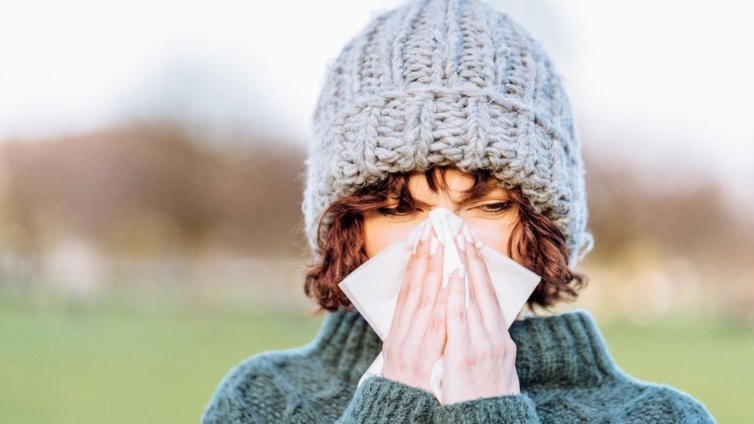The virus that causes the common cold can effectively boot the Covid-19 virus out of the body's cells, say researchers.
Some viruses are known to compete in order to be the one that causes an infection.
And University of Glasgow scientists say it appears cold-causing rhinovirus trumps coronavirus.
The benefits might be short-lived but rhinovirus is so widespread, they add, it could still help to suppress Covid-19.
Think of the cells in your nose, throat and lungs as being like a row of houses. Once a virus gets inside, it can either hold the door open to let in other viruses, or it can nail the door shut and keep its new home to itself.
Influenza is one of the most selfish viruses around, and nearly always infects alone. Others, such as adenoviruses, seem to be more up for a houseshare.
There has been much speculation about how the virus that causes Covid, known as Sars-CoV-2, would fit into the mysterious world of "virus-virus interactions".
The challenge for scientists is that a year of social distancing has slowed the spread of all viruses and made it much harder to study.
The team at the Centre for Virus Research in Glasgow used a replica of the lining of our airways, made out of the same types of cells, and infected it with Sars-CoV-2 and rhinovirus, which is one of the most widespread infections in people, and a cause of the common cold.
If rhinovirus and Sars-CoV-2 were released at the same time, only rhinovirus is successful. If rhinovirus had a 24-hour head start then Sars-CoV-2 does not get a look in. And even when Sars-CoV-2 had 24-hours to get started, rhinovirus boots it out.
"Sars-CoV-2 never takes off, it is heavily inhibited by rhinovirus," Dr Pablo Murcia told BBC News.
He added: "This is absolutely exciting because if you have a high prevalence of rhinovirus, it could stop new Sars-CoV-2 infections."
Similar effects have been seen before. A large rhinovirus outbreak may have delayed the 2009 swine flu pandemic in parts of Europe.
Further experiments showed rhinovirus was triggering an immune response inside the infected cells, which blocked the ability of Sars-CoV-2 to make copies of itself.
When scientists blocked the immune response, then levels of the Covid virus were the same as if rhinovirus was not there.
Latest Stories
-
Dr Amakye Boateng criticizes Akufo-Addo’s government for weakening judiciary
47 minutes -
We need to consider shifting the date for elections – Bullgod
2 hours -
I’m proud of his current team – Bullgod commends Shatta Wale for performing at Vybz Kartel’s concert
2 hours -
Michael Baidoo joins Plymouth Argyle in record deal until 2028
3 hours -
GPL 2024/25: Hearts beat Legon Cities to go second on league table
6 hours -
Ghana first science fiction movie goes global via MiSciFi
6 hours -
Attorney General embarrasses Ghana with bad GRA math at Tullow Arbitration
6 hours -
Kofi Boakye, Gbevlo-Lartey named in Mahama’s interim National Security team, Prosper Bani leads
6 hours -
USA President names delegation to attend Mahama’s inauguration ceremony
7 hours -
Deputy Foreign Affairs Minister denies demanding or taking $3,000 from accuser
7 hours -
Clerk to Parliament summons MPs for 1st sitting of 9th Parliament on midnight of 7th January
7 hours -
Nyantakyi was sabotaged – Asamoah Gyan claims
7 hours -
British woman and fiance found dead in Vietnam villa
8 hours -
Hapa Space, UNDP and MasterCard Foundation boost youth entrepreneurship at YIC Pitch Day
8 hours -
Kudus donates to Teshie Children’s Home and Rahman Basic School on New Year’s day
8 hours

